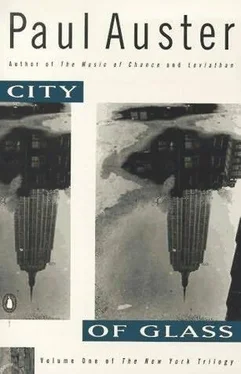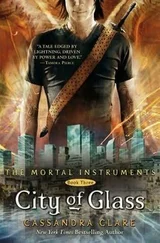Paul Auster - City of Glass
Здесь есть возможность читать онлайн «Paul Auster - City of Glass» весь текст электронной книги совершенно бесплатно (целиком полную версию без сокращений). В некоторых случаях можно слушать аудио, скачать через торрент в формате fb2 и присутствует краткое содержание. Жанр: Современная проза, на английском языке. Описание произведения, (предисловие) а так же отзывы посетителей доступны на портале библиотеки ЛибКат.
- Название:City of Glass
- Автор:
- Жанр:
- Год:неизвестен
- ISBN:нет данных
- Рейтинг книги:5 / 5. Голосов: 1
-
Избранное:Добавить в избранное
- Отзывы:
-
Ваша оценка:
- 100
- 1
- 2
- 3
- 4
- 5
City of Glass: краткое содержание, описание и аннотация
Предлагаем к чтению аннотацию, описание, краткое содержание или предисловие (зависит от того, что написал сам автор книги «City of Glass»). Если вы не нашли необходимую информацию о книге — напишите в комментариях, мы постараемся отыскать её.
City of Glass — читать онлайн бесплатно полную книгу (весь текст) целиком
Ниже представлен текст книги, разбитый по страницам. Система сохранения места последней прочитанной страницы, позволяет с удобством читать онлайн бесплатно книгу «City of Glass», без необходимости каждый раз заново искать на чём Вы остановились. Поставьте закладку, и сможете в любой момент перейти на страницу, на которой закончили чтение.
Интервал:
Закладка:
One problem still remained. If he was unable to contact Virginia Stillman-if, as he believed, he was meant not to contact her-how exactly was he to proceed? His job was to protect Peter, to make sure that no harm came to him. Did it matter what Virginia Stillman thought he was doing as long as he did what he was supposed to do? Ideally, an operative should maintain close contact with his client. That had always been one of Max Work's principles. But was it really necessary? As long as Quinn did his job, how could it matter? If there were any misunderstandings, surely they could be cleared up once the case was settled.
He could proceed, then, as he wished. He would no longer have to telephone Virginia Stillman. He could abandon the oracular busy signal once and for all. From now on, there would be no stopping him. It would be impossible for Stillman to come near Peter without Quinn knowing about it.
Quinn paid up his check, put a mentholated toothpick in his mouth, and began walking again. He did not, have far to go. Along the way, he stopped at a twenty-four-hour Citibank and checked his balance with the automatic teller. There were three hundred and forty-nine dollars in his account. He withdrew three hundred, put the cash in his pocket, and continued uptown. At 57th Street he turned left and walked to Park Avenue. There he turned right and went on walking north until 69th Street, at which point he turned onto the Stillmans' block. The building looked the same as it had on the first day. He glanced up to see if there were any lights on in the apartment, but he could not remember which windows were theirs. The street was utterly quiet. No cars drove down it, no people passed. Quinn stepped across to the other side, found a spot for himself in a narrow alleyway, and settled in for the night.
12
A long time passed. Exactly how long it is impossible to say. Weeks certainly, but perhaps even months. The account of this period is less full than the author would have liked. But information is scarce, and he has preferred to pass over in silence what could not be definitely confirmed. Since this story is based entirely on facts, the author feels it his duty not to overstep the bounds of the verifiable, to resist at all costs the, perils of invention. Even the red notebook, which until now has provided a detailed account of Quinn's experiences, is suspect. We cannot say for certain what happened to Quinn during this period, for it is at this point in the story that he began to lose his grip.
He remained for the most part in the alley. It was not uncomfortable once he got used to it, and it had the advantage of being well hidden from view. From there he could observe all the comings and goings at the Stillmans' building. No one left and no one entered without his seeing who it was. In the beginning, it surprised him that he saw neither Virginia nor Peter. But there were many delivery men constantly coming and going, and eventually he realized that it was not necessary for them to leave the building. Everything could be brought to them. It was then that Quinn understood that they, too, were holing up, waiting inside their apartment for the case to end.
Little by little, Quinn adapted to his new life. There were a number of problems to be faced, but one by one he managed to solve them. First of all, there was the question of food. Because utmost vigilance was required of him, he was reluctant to leave his post for any length of time., It tormented him to think that something might happen in his absence, and he made every effort to minimize the risks. He had read somewhere that between 3:30 and 4:30 A.M. there were more people asleep in their beds than at any other time. Statistically speaking, the chances were best that nothing would happen during that hour, and therefore Quinn chose it as the time to do his shopping. On Lexington Avenue not far north there was an all-night grocery, and at three-thirty every morning Quinn would walk there at a brisk pace (for the exercise, and also to save time) and buy whatever he needed for the next twenty-four hours. It turned out not to be much-and, as it happened, he needed less and less as time went on. For Quinn learned that eating did not necessarily solve the problem of food. A meal was no more than a fragile defense against the inevitability of the next meal. Food itself could never answer the question of food; it only delayed the moment when the question would have to be asked in earnest. The greatest danger, therefore, was in eating too much. If he took in more than he should, his appetite for the next meal increased, and thus more food was needed to satisfy him. By keeping a close and constant watch on himself, Quinn was gradually able to reverse the process. His ambition was to eat as little as possible, and in this way to stave off his hunger. In the best of all worlds, he might have been able to approach absolute zero, but he did not want to be overly ambitious in his present circumstances. Rather, he kept the total fast in his mind as an ideal, a state of perfection he could aspire to but never achieve. He did not want to starve himself to death-and he reminded himself of this every day-he simply wanted to leave himself free to think of the things that truly concerned him. For now, that meant keeping the case uppermost in his thoughts. Fortunately, this coincided with his other major ambition: to make the three hundred dollars last as long as he could. It goes without saying that Quinn lost a good deal of weight during this period.
His second problem was sleep. He could not stay awake all the time, and yet that was really what the situation required. Here, too, he was forced to make certain concessions. As with eating, Quinn felt that he could make do with less than he was accustomed to. Instead of the six to eight hours of sleep he was used to getting, he decided to limit himself to three or four. Adjusting to this was difficult, but far more difficult was the problem of how to distribute these hours so as to maintain maximum vigilance. Clearly, he could not sleep for three or four hours in a row. The risks were simply too great. Theoretically, the most efficient use of the time would be to sleep for thirty seconds every five or six minutes. That would reduce his chances of missing something almost to nil. But he realized that this was physically impossible. On the other hand, using this impossibility as a kind of model, he tried to train himself into taking a series of short naps, alternating between sleeping and waking as often as he could. It was a long struggle, demanding discipline and concentration, for the longer the experiment went on, the more exhausted he became. In the beginning, he tried for sequences of forty-five minutes each, then gradually reduced them to thirty minutes. Towards the end, he had begun to manage the fifteen-minute nap, with a fair amount of success. He was helped in his efforts by a nearby church, whose bells rang every fifteen minutes-one stroke on the quarter-hour, two strokes on the half-hour, three strokes on the three-quarter-hour, and four strokes on the hour, followed by the appropriate number of strokes for the hour itself Quinn lived by the rhythm of that clock, and eventually he had trouble distinguishing it from his own pulse. Starting at midnight, he would begin his routine, closing his eyes and failing asleep before the clock had struck twelve. Fifteen minutes later he would wake,, at the half-hour double stroke fall asleep, and at the three-quarter-hour triple stroke wake once more. At three-thirty he would go off for his food, return by four o'clock, and then go to sleep again. His dreams during this period were few. When they did occur, they were strange: brief visions of the immediate-his hands, his shoes, the brick wall beside him. Nor was there ever a moment when he was not dead tired.
Читать дальшеИнтервал:
Закладка:
Похожие книги на «City of Glass»
Представляем Вашему вниманию похожие книги на «City of Glass» списком для выбора. Мы отобрали схожую по названию и смыслу литературу в надежде предоставить читателям больше вариантов отыскать новые, интересные, ещё непрочитанные произведения.
Обсуждение, отзывы о книге «City of Glass» и просто собственные мнения читателей. Оставьте ваши комментарии, напишите, что Вы думаете о произведении, его смысле или главных героях. Укажите что конкретно понравилось, а что нет, и почему Вы так считаете.












